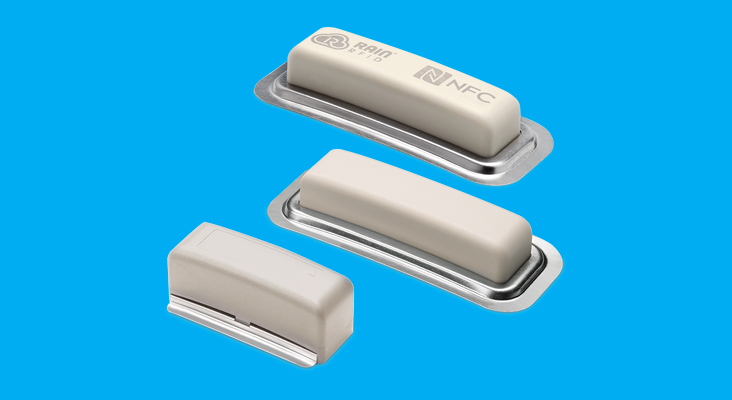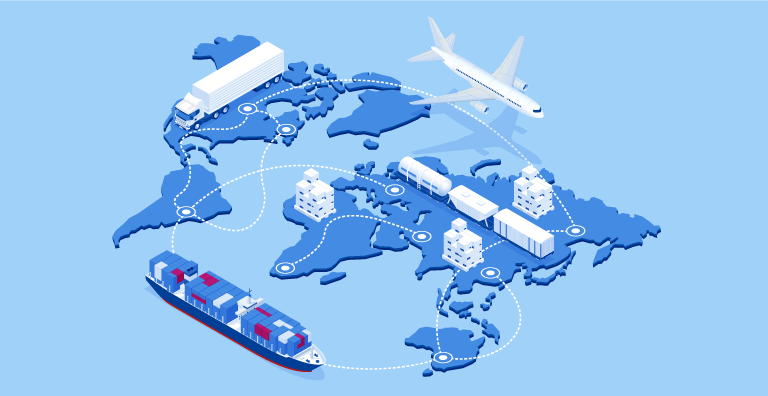Seven Ways RFID Supports International Supply Chains
International Customs Day recognizes the role that customs officials play in enabling the flow of international trade and security of supply chains. The day stems from the formation of the Customs Cooperation Council in Brussels, which was formally inaugurated on January 26, 1953. The intergovernmental council was renamed as the World Customs Organization (WCO) in 1994. Today the WCO represents 183 customs administrations worldwide, which manage and process 98% of world trade.
As a company that provides multiple solutions to the global logistics industry, we join in celebrating the contribution of RFID, LoRa and Bluetooth® Low Energy to global logistics efficiency.
International supply chains rely heavily on efficient maritime logistics. 1.83 billion metric tons of goods were carried by sea container in 2017. With millions of containers arriving at ports around the world, RFID schedules support accurate manifests, which help customs officials to quickly check that the correct numbers of containers have arrived at a border. Rapid checks speed processing, reduce spoilage and maintain supply chain security.
Here are just a few of the ways that we help our customers:
1. Improving Yard Management Efficiency
Outdoor storage and picking use a combination of passive RFID tags that allow containers to be rapidly checked in and out of storage facilities and newer active RFID tags which light up to identify their location when in range of a reader.
East Coast Warehouse has set aside 14.5 acres of its logistics services yard at the Port of New York/ New Jersey for U.S. Customs inspections. Containers from overseas are driven from the port to the yard, where their contents are unloaded and stored in temperature-controlled warehouses. Empty containers are then stacked and stored until they are returned to the port. With up to 1,100 containers on site, East Coast Warehouse employees often spent a lot of time searching for specific containers in the vast yard and warehouses to avoid fees being levied for late return of containers.
Supply chain management company PINC was the first provider to offer a cloud-based yard management system that used low-cost passive RFID tags and GPS, to locate containers in real time. East Coast Warehouse was already using HID’s Dura 1500 passive tags on its own fleet of trucks. PINC commissioned HID to develop customized temporary tags with a read range of up to 15.24 meters / 50 feet, which could be quickly and securely fixed to port drayage trucks as they arrived at the yard and removed before they left. HID developed a robust, magnetic tag, encased in bright yellow ABS to make it highly visible and durable. The tag is encoded with an ID number that corresponds to a barcode printed on the drayage driver’s gate pass. As drivers arrive at the gate, a security guard scans the barcode, which uploads the container chassis ID and security seal numbers to PINC’s Advanced Yard Management System and assigns a corresponding ID to a temporary RFID tag. The guard affixes the magnetic tag to the container and tells the driver where to drop off the container. The yard management system then starts a timer to alert East Coast Warehouse when the container needs to be returned to the port terminal and its location in the yard. Before the container leaves the yard, the guard uses the tag’s patented built-in handles to remove the tag for reuse.
2. Improving Logistics Efficiency Across India
Delhi-Mumbai Industrial Corridor (DMIC) developed a DMICDC Logistic Data Bank to provide full visibility of the movement of containers across India. By partnering with systems integrator NEC and using HID’s Exo 800C RFID tags, DMIC was able to efficiently track containers as they were transported between ports, airports, container terminals and railway depots. This application of RFID was described by an RFID Journal Live Awards judge as being “instrumental in improving trade in a key growth area of the world by enabling infrastructure and increasing logistics efficiencies in the Indian transportation and logistics corridor.”
3. Conveyancing
Returnable transport items (RTI) such as beer kegs, gas cylinders, chemical drums, gitterboxes and horticulture trolleys are high value commodities which represent a large capital expenditure to logistics organizations. Each time they make their journey by sea, land and air, RTIs are exposed to harsh environmental conditions, rough handling and temperature extremes. RFID tags and associated data management technology provide an efficient solution to track the location, identity and condition of goods in transit, and the containers in which they are being conveyed.
HID IDT’s Keg Tag transponders enhance the inventory tracking and lifecycle management of cylindrical RTIs. Anti-collision technology allows readers to gain information from multiple tags at the same time, to enable reliable inventory tracking among a dense field of objects. RAIN® RFID (UHF) transponders enable real-time inventory and minimize processing time.
With a read range of up to 10 meters, up to 2560 bits EEPROM and supporting international frequency ranges of 860 MHz to 960 MHz, compatible with US, European and Japanese standards, HID UHF Keg Tag devices allow full pallets, or even entire truckloads of RTIs to be accurately accounted for in a matter of seconds. This allows every container to be counted and identified as a truck leaves a distribution center and arrives at its destination. Full visibility is provided in the warehouse, en route and with the end customer. The combination of RFID and NFC also allows for deeper customer engagement by enabling user interaction on customers’ mobile phones.
4. Securing Supply Chains in Automotive Manufacturing
Gitterboxes are standard-sized metal containers used for safely transporting semi-finished components within the automotive manufacturing supply chain. Different manufacturers’ gitterboxes are often stored in the same location at the same time. With approximately 40 million of the boxes in circulation within Europe alone, it’s vital to maintain visibility of their location to allow manufacturers to efficiently manage stock and minimize bottlenecks that could impact lead times. RFID offered the obvious solution to keep track of components as they progress through the supply chain. However, early industrial RFID tags were too bulky, protruded from the cage and risked damaging expensive automotive components and the people who handled the boxes.
An elegant RFID solution was developed through a collaboration between Logistics Arts, HID and Mieloo & Alexander.
As the pioneer of on-metal RFID tags, HID was selected to deliver RFID technology that could provide consistent read performance on the metal gitterboxes. Product design company Logistics Arts developed an elegant, hinged tag which clips flush to the standard-sized metal cage. Mieloo & Alexander developed a management information tool that provides manufacturers including BMW, VW and Audi with full visibility of the location of their gitterboxes across the supply chain.
5. Tracking Returnable Transport Items
Danish company Container Centralen provides robust trolleys to the global horticultural industry. Members are supplied with standardized high-quality returnable transport items (RTIs) fitted with robust, waterproof HID RFID tags, which have a standard 16 meter read range and can withstand storage temperatures of -30°C up to +70°C and operating temperatures of -10°C to +60°C. The tags have a visible antenna, and removal destroys the RFID functionality, making it extremely difficult to counterfeit the tags or RTIs, so that members are assured that their products are being conveyed on genuine Container Centralen trolleys. With 4.5 million trolleys in circulation, the tags make it easier to scan and track the location of goods in transit, ensuring their freshness, while effectively combatting fraud.

6. FloraHolland Stems Time Lost Searching for Blooms
More than half of the world’s $30 billion cut flower trade is exported from the Netherlands. Timely transfers through customs are crucial to ensure that cut flowers are kept fresh. Minimizing the time that flowers spend at ports before they are transferred to cool storage helps to maintain the best price for the growers.
Applying passive UHF RFID tags to more than quarter of a million metal auction trolleys minimized the time that auctioneer FloraHolland takes to locate flowers at the receiving dock. Regaining time previously spent searching for the right trolleys is reported to have saved the company $200,000 a year. RFID readers stationed around the dock and cooled storage areas also allow FloraHolland to precisely measure how long it took to transfer flowers to a temperature-controlled unit, to guarantee their freshness and gain a better price at auction for members of its cooperative.
7. Cold Chain Management
In addition to our identification and tracking technology, HID’s latest smart RFID sensor labels accurately report temperatures between 120°C down to -70°C, offering a cost-effective solution for monitoring the condition of large quantities of perishable goods and assets in storage and transit. Our partner, Lyngsoe Systems, has demonstrated how our low-cost, printable RFID labels allow a single reader to measure the liquid volume and real-time temperature of 200 individual vaccine vials from 1.5 meters away. The technology allows instant verification of the origin, authenticity and condition of assets and can be used to support a broad range of industrial, condition monitoring applications from biopharma to dairy products.
For more about how HID’s RFID technology is benefitting global supply chains, read our blog, Why RFID Is Such a Vital Link in Global Supply Chains.
David Owen is an integrated Marketing Manager and brand builder with both professional agency and client-side experience. His client-side experience has included the Commercial Property sector with Vail Williams LLP and before that was in the conference, meeting, events and golf industry. In 2019, David joined Omni-ID (now an HID company). David and his family reside in the quiet countryside of Surrey England, where he likes to enjoy a round of golf.
